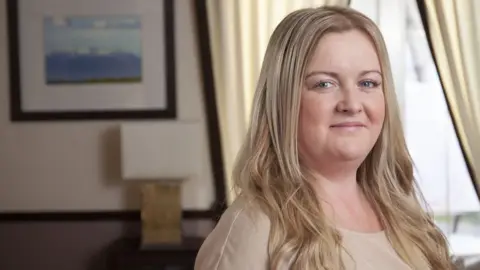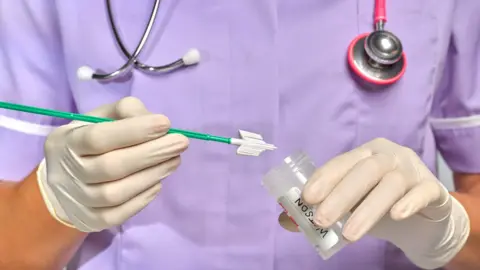I had no cancer symptoms but a smear saved my life
 Scottish Government
Scottish GovernmentA woman who had no cancer symptoms has told how a routine smear test saved her life.
Laura McAdam was just 31 when a biopsy, taken during a colposcopy, confirmed she had cervical cancer.
The diagnosis came two years after her regular test came back showing cell changes.
Ms McAdam, 36, shared her story as part of a new Scottish government campaign which urges women not to ignore their smear test invitation.
Uptake of cervical screening in Scotland has declined in recent years and in 2020/21 only 69.3% of those eligible attended appointments.
This compares to 71.2% the previous year and 73.1% in 2018/19.
Earlier this year the Scottish government confirmed that three women had died after being wrongly excluded from Scotland's cervical cancer screening programme.
'I had no symptoms whatsoever'
Ms McAdam, from Ayrshire, said: "I was diagnosed early thanks to attending a regular smear test and I'm so grateful that my cell changes were picked up early enough - it saved my life.
"I had no symptoms whatsoever before that, so I know first-hand how important it is to attend screenings, even if nothing seems wrong."
Cervical cancer kills two women every day in the UK but it is largely preventable and screening, which is offered to women aged 25 to 64, is the best way to protect against the disease.
Despite this almost one in three women in Scotland still don't go for the five-minute smear test.
After her smear test showed cell changes, Ms McAdam attended check-up appointments every six months.
When the results kept showing cell changes, she underwent a colposcopy - a procedure used to look at the cervix - in November 2016.
A week later she received her cervical cancer diagnosis and in January 2017, Ms McAdam had a hysterectomy.
She was scheduled in for a five-week course of precautionary chemotherapy and radiotherapy treatment.
But a tear in Ms McAdam's bladder was detected shortly before the course was meant to start and her doctors decided to cancel the treatment.
 Getty Images
Getty ImagesFollowing a bladder operation she now attends scans every six months to closely monitor her recovery.
Ms McAdam, who volunteers with Jo's Cervical Cancer Trust which campaigns on the importance of cervical screening, said: "I had a few niggly back pains as a result of the bladder operation, but other than that I feel absolutely fine now.
"All the hospital staff have been fantastic throughout all this and I can't thank them enough for their care."
Screening errors
The new campaign also provides tips and reassurance around the appointment to help women overcome barriers to attending, such as embarrassment or worry.
Public Health Minister Maree Todd said: "A five-minute smear test could save your life. Even if you expect everything is fine, it's important not to ignore your invite, as the test can help stop cervical cancer before it starts."
The test screens for human papillomavirus (HPV), the main cause of cervical cancer, and helps ensure cell changes are identified and treated earlier.
She added that while some may feel anxious about the test information and advice is available to make the experience easier.
Earlier this year Ms Todd told the Scottish Parliament that about 600 women had been wrongly excluded from the cervical cancer screening programme following a partial hysterectomy.
Three of those women have since died and the government strongly suspects that one developed cancer as a result of her exclusion.
In June Ms Todd issued "heartfelt apologies" to the women who were excluded from the programme and went on to develop cervical cancer.
